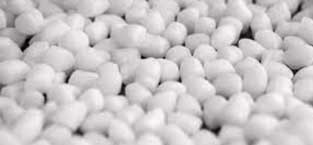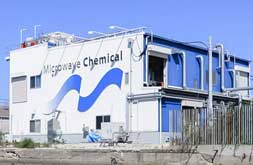Green tie-ups: Celanese/Mitsubishi Chemical collaborate on recycled POM; Mitsui Chemicals/Microwave to use microwave tech in chemical recycling

US chemical firm Celanese Corporation and Japan’s Mitsubishi Chemical Advanced Materials (MCAM), are to jointly collaborate to further develop mechanical recycling solutions for both post-industrial and post-consumer sources of polyoxymethylene (POM), also known as acetal copolymer, to meet the requests from customers seeking recycled content options and carbon dioxide reductions while still maintaining product consistency, quality and performance.
Celanese and MCAM plan to work together to assess options to convert waste streams into marketable, end-product formulations so that Celanese can offer its customers sustainable options for scrap or end-of-life waste with assurances of closed loop material reuse.
In November 2020, Celanese introduced a sustainable polyacetal product offering known as POM ECO-B, a mass-balance, bio-based option which allows customers to realise reduction in carbon dioxide emissions in their end-use products and advance toward their renewable content goals. While POM ECO-B is commercially available now, not all customers or industries are ready to adopt bio-mass balance that comes with its carbon dioxide footprint reduction benefit.
Now, together with MCAM, Celanese will build upon its sustainable product offerings by initiating development of a recycled content option of the Celanese Hostaform/Celcon POM product that will be marketed as POM ECO-R, a recycled content offering to be jointly developed with MCAM. MCAM would conduct the recycled feedstock collection, separation, and processing, while Celanese would provide the formulation, product technology and production capability. Celanese expects to offer to existing and new customers its POM ECO-R solution with a recycled content offering of up to 30%.
POM ECO-B, where the polymer itself is identical to its fossil-based twin but where the carbon feedstock is replaced with bio-based feedstock in a mass-balance approach, is different from POM ECO-R in that POM ECO-R would be derived from both post-industrial and post-consumer sources of POM to offer a recycled content solution.

In other news, Mitsui Chemicals, Inc. (Tokyo) and Microwave Chemical Co. Ltd. (Suita, Japan) have launched a new initiative aimed at commercialising the use of microwave technology in the chemical recycling of plastic waste. The project involves directly producing raw monomers from plastics that have conventionally been tricky to recycle, including automotive shredder residue (ASR) – a mixture of principally polypropylene-based plastics – and thermosetting sheet moulding compound (SMC), which is used in bathtubs and vehicle parts.
Since entering into a strategic partnership in 2017 to promote joint development of next-generation chemical process technologies, Mitsui Chemicals and Microwave Chemical have built up a solid relationship, including through partial equity investment. The two companies are together looking at leveraging microwave technology for a variety of chemical processes.
This new initiative is an attempt to commercialize a chemical recycling technique that uses the PlaWave microwave-based plastic degradation technology developed by Microwave Chemical to directly break down ASR and SMC products into raw monomers. As it eliminates an intermediate step, direct monomerisation is a more efficient means of recycling plastic waste into plastic than the conventional approach, which involves turning the waste into oil before monomerisation. The technique also promises to reduce CO2 emissions through the use of electricity generated from renewable energy to power the decomposition process.
With initial deliberations having yielded positive results, the project will proceed to verification using Microwave Chemical’s bench-scale equipment before the end of fiscal 2021. A move to full implementation will be then be considered with the objective of promptly commencing demonstration tests.
(IMA)Subscribe to Get the Latest Updates from IMA Please click here
©2021 Injection Moulding Asia. All rights reserved.













